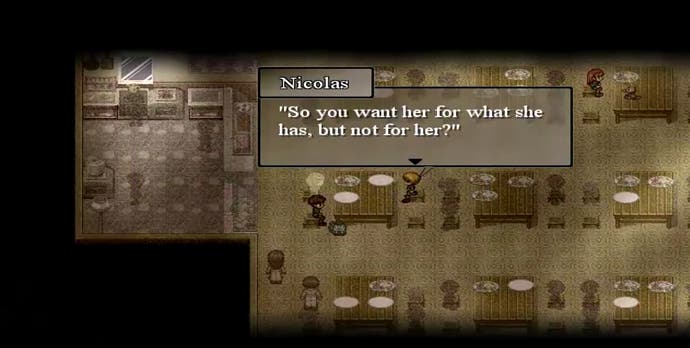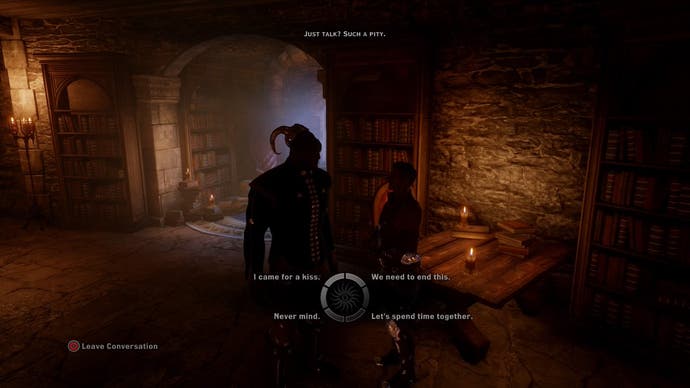Video game romance is broken
A look at love, from Dream Daddy to Mass Effect.
Florence, a short mobile game by the developer Mountains, covers more ground on the topic of romantic love in under an hour than most games have for decades. It does so by focusing on a few small watershed moments of being in love, from developing an interest in someone to the pleasures and hurdles of domestic co-existence to letting go of a relationship that no longer works.
When thinking about romance in games, towering examples like Dragon Age and Mass Effect come to mind, games that made dating a major part of their appeal. Many other games, such as the Final Fantasy series, frequently include romantic subplots in their narrative. In visual romance novels like Clannad and Dream Daddy, dating is the main point of the exercise. Other games focus on tragic love and its aftermath, like Last Of June.
Generally romance in video games can be subdivided into the act of falling in love and love as a catalyst for certain stories and plot points. These are undoubtedly important and exciting aspects of love and romance, but aspects only. Florence's designer Ken Wong calls them milestones - situations everyone who has been in a relationship can identify with, small moments that stay with us even years later due to the sheer impact they had on us at the time.
Many games confuse being impactful with being dramatic, which is understandable when you look at popular love stories like Romeo and Juliet or Orpheus and Eurydice that stood the test of time. Stories like these paint romance as something passionate and consuming, making it a fitting addition to action-packed and exciting plotlines. Their protagonists take control of the situation that prevents them from achieving happiness together: in Romeo and Juliet, Juliet takes a sleeping potion in a bid to avoid marrying someone else, in Orpheus and Eurydice Orpheus refuses to accept the death of his wife.

Control is what makes the power fantasies of so many games work. Most games still loathe wresting control away from their players, even though a lack of control is in many ways an important component to navigating a relationship - after all, it takes two to tango. The most egregious example of giving players total control over a romance is Dragon Age: Inquisition. The Inquisitor gathers people around them who are impressed with their accomplishments and who keep affirming their status as someone special. Solas, for example, says he "felt the whole world change" within moments of meeting the Inquisitor, Blackwall remarks on the importance of the Inquisitor so fervently you can start flirting with him immediately after recruiting him. Other characters, such as Cullen, react to your direct approach with discomfort that always takes the form of adorable shyness rather than rejection.
Until you decide to commit to a relationship, you are free to flirt with everyone without repercussions, and if you want to end the relationship at any point, you can do so. It's entirely in your power. There is exactly one time a partner comes close to ending it with you, and you are given the option to prevent it.
Games like Dragon Age or visual romance novels are all about saying the right thing to get someone to like you. An alternative of this mechanic which basically does the same sort of thing is gift-giving. Granted, in Stardew Valley for example it's not necessarily the rarest gift that ends up the most appreciated, but the overall message is that saying what someone would like to hear and giving them what they want is the way to success.
Since Florence is set in the modern world, it portrays milestones from later stages of a relationship that are deliberately mundane. It's important to note that it just presents them and doesn't allow players to change events. This way it avoids bias and makes it clear that some things just happen, both good and bad.

Games like to shy away from the difficult aspects of relationships in their endeavour to let us win. In addition to that, wanting to handle these aspects with the necessary respect often means a reliance on narrative over gameplay. Compare To The Moon and Last Of June, which both deal with old men reliving their memories of their relationships and lives as a whole. Last of June clearly relies on happy memories in order to make players want to reverse what happened and thus completely negate the grieving process. To The Moon, on the other hand, puts you in the role of two bystanders with no personal stake in the relationship, which results in a more passive experience.
One game that achieved a good balance between actively dealing with your memories and letting the stones fall as they may is a bit of a surprise: right until its end Hellblade made it seem like you were following the Orpheus and Eurydice plot of resurrecting a lover, only to realise that the true strength lies in letting go.
There is still a lot of fun to be had with the mundane aspects of love and everyday life together. If Octodad managed to make household chores chaotic fun, the same is possible for romantic gestures. If David Cage thinks brushing your teeth is a gameplay element worth including, then so is racing (or, er, crawling) through inner-city traffic to get your partner to their doctor's appointment on time.
When it comes to the portrayal of physical acts, many experimental games with a focus on sex currently lead the way. The physical signs of falling in love and touching should be part of what makes a good romance - hugging and holding hands are platonic actions that are great to express mechanically, and great things in general.
Even regarding the popular mechanics that exist, like the aforementioned dialogue options, there's more that can be done. Dialogue options still look too much like morality options that feature an added option to flirt, which is always clearly made out as such. If you want someone to like you, you have to flirt and pick the option to be nice. How about less clear-cut options instead? After all, it's often especially difficult to know what the right thing to say is when you would like to get to know someone better or want to impress them.

If that leads to an argument, even better - disagreements and compromise are vital parts to any relationship, romantic or not. No one agrees all the time, and you should be able to experience that through play. Disagreement doesn't have to mean frosty silence, even though it is a good measure to show players they don't control everything. Mass Effect Andromeda takes steps in the right direction with crew members openly disapproving with your actions to the point of not speaking to you at all. However, this has no lasting consequences, particularly not once you have entered into a relationship with one of them.
There needs to be more commitment to romance that is nothing but. Alone With You bills itself as a sci-fi romance adventure, but its romantic portions are sidequests, easily used as means to an end in order to obtain information. In other games, romancing a companion means always having someone who carries your stuff and helps you in battle.
In comparison, Final Fantasy IX and X develop the relationship between their protagonists slowly from initial attraction into something based on shared experiences. That way love develops through shared experiences, and not at the player's insistence, and there is no direct boon to gameplay.
If a game places importance on romance, romance should extend past the act of starting a relationship to reflect the effort that it takes to maintain one. That could also mean moving away from "relationship pick and mix", where the only thing that matters is who you want to date, and you can drop partners to immediately replace them with another. While technically complicated, games could invest in compatibility the way online dating simulators do. It's by no means a fool-proof system, but it's an example to illustrate how difficulty in finding the right person to spend your days with should surpass the difficulty of buying a pint of milk, even in a game.
Sometimes you just want to bonk a weirdly good-looking alien in a game, and that's okay. Among the many complex subjects games cover in-depth, subjects that are equally important to the human experience, a thorough exploration feels overdue. After all, love is a many-splendored thing after all, and it's rewarding to treat it as such.

